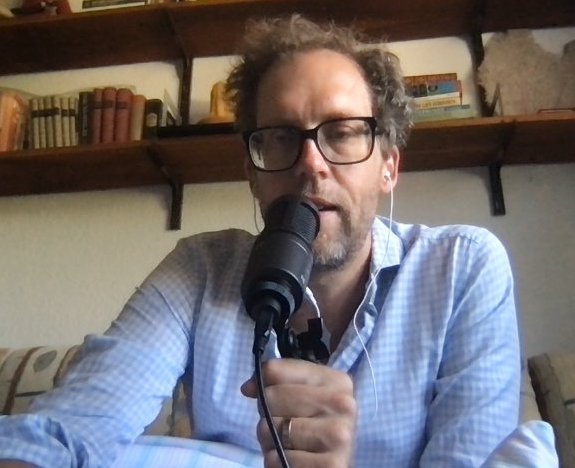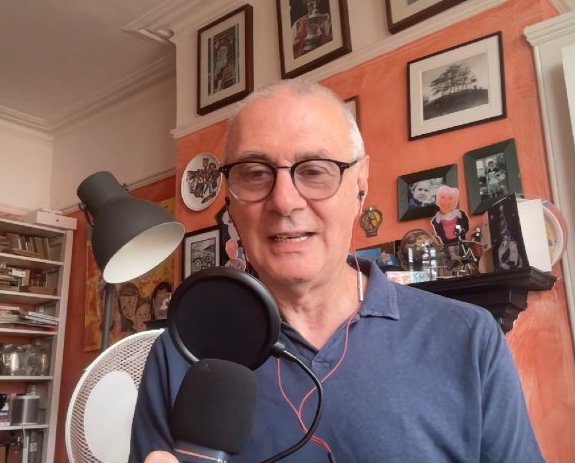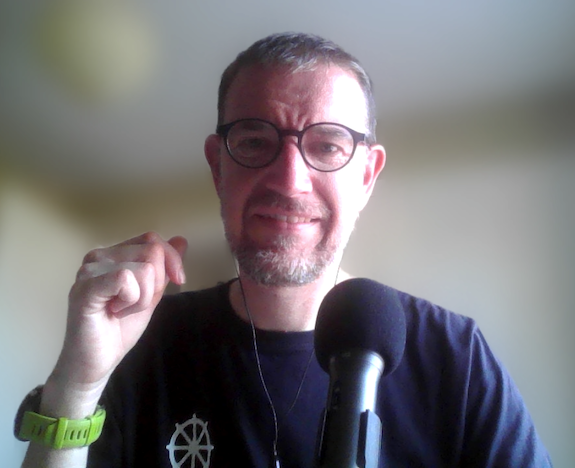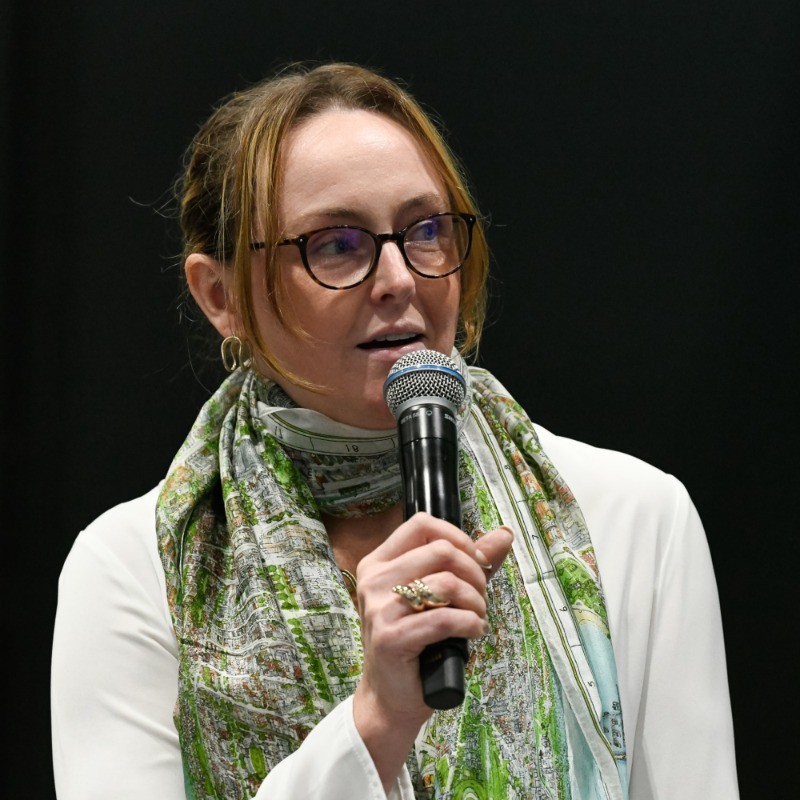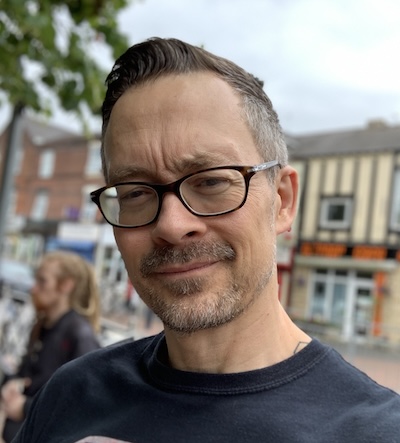Subscribe
Ed talks with Jan-Piet Mens, one of the creators of open-source project OwnTracks, a privacy focused location tracking service. Jan-Piet presented the service at the 7 April 2020 Geomob Online. Unfortunately Ed stupidly started the recording of the talk a bit late, so we have no recording. But there is a link below to a longer, more detailed talk about OwnTracks if you want to learn more.
Relevant links:
About the podcast
On the Geomob podcast every week we discuss themes from the geo industry, interview Geomob speakers, and provide regular updates about our own projects.
Popular podcast topics:
The Geomob podcast is hosted by:
Autogenerated Transcript:
Ed 00:01 Welcome to the geomob podcast where we discuss geoinnovation in any and all forms, be it for fun or profit. Hi everyone. Welcome back to another episode of the geomob podcast. Today I am delighted to have JP Mens with me here today who was one of the makers of a software called OwnTracks. JP was originally scheduled to talk at the geomob Munich and at the end of March, unfortunately we've had to cancel that because of the virus, but this is a very cool software. So I wanted to make sure we got him on here as a chance to, to tell us what own tracks is all about. JP, why don't we start with you introducing yourself and telling us very briefly what is it attracts.
Jan-Piet 00:41 Very good. Thank you ed for having me on the show. Yes, indeed. We should have met up in München or Munich. Unfortunately that's not possible. We'll do it this way. So, who am I? I uh, I'm JP mens. I'm Jan Piet. I originally had the idea of creating something that would do what Google latitude used to do. I think a project died sometime in 2013, if I remember correctly. And um, so OwnTracks, uh, was the, a little bit of a crazy idea at the time. I, uh, was interested in a transport on an TCP transport protocol called MQTT, which by the way does not mean anything. That's not an acronym. And I basically had the idea of how difficult would it be to have a little app running on a phone which would publish a person's location over MQTT. And interestingly, I think it was, uh, two days later, three days later, this, very, very shortly after that somebody called Alexander Rust showed up and said, well, how about this?
Jan-Piet 01:46 I didn't know the guy. And he actually had a prototype running. And a few days later, maybe a week later, my, a very, very good friend Christoph had basically done exactly the same thing for iOS. So I was fascinated and that's how this whole project started, which at the beginning was called MQTTitude a beautiful name, which I still love, sort of a combination between MQTT and latitude, but we then later on thought, well nobody can pronounce it and we even have difficulty pronouncing this and my family had difficulty pronouncing it. So we changed the name to a two OwnTracks and it is supposed to not only be my own tracks the name OwnTracks means my own tracks. So other than the NSA, I am the only person who has my tracking data. Or you are the only person that has your tracking data.
Jan-Piet 02:38 So that's OwnTracks. OwnTracks is the one on the back end software. On the other hand, a frontend software. So two apps, one for iOS, one for Android, which collect location information. And this location information is sent out in a as JSON payload, what we call our OwnTracks JSON payload to a server to a small, which you host yourself or own tracks, users, hosts themselves. Or maybe you would host a small server for, for your family, for your friends, et cetera. And yeah, that's, that's basically in a couple of sentences what a, what on tracks does,
Ed 03:15 so, so who is using, is this hobbyists or this is, you know, what, what's the barrier to entry? Do I need to first set up my own server or what term do people are involved in this project and what's the goal? Is it that just kind of privacy obsessed geeks run at themselves or is it, is this a tool that for normal people, you see what I'm saying?
Jan-Piet 03:34 It's a tool for normal people. However normal people need some sort of friend or acquaintance who can actually yes, set up a central server. The server several sounds very, a very heavy server is something like a raspberry PI or BeagleBone Black. A very, very simple system Unix Linux system, which is able to run a Mosquitto broker or which is able to run HTTP server like Apache or nginx. We currently, or we have since also implemented support for location data over HTTP. Who uses on Trex? Mainly? Probably mainly geeks. Andre own Trex is not an app which you would download from the app store or from the Playstore or whatever it's called and then sort of set up and go. The reason it's not that is we don't have a cloud service. We don't, we own, the only thing we provide is basically the software. So we have the apps, so we have all sorts of programs which run in the background and on, on the back end. But we don't provide the service. We don't, it's not like a Foursquare, uh, I heard yesterday, I think you use it, it's not something that you can immediately start running. You can't sign up for own tracks. We don't, we don't have a central service. We don't have a central service because we don't want your data. That's, it's your data. You're supposed to have it. We don't even know what you're doing with that data.
Ed 04:54 And so what are people using it for? So once you know, I've got it on my phone, I travel around and it records my location and then that goes up to my server and then what? Then I can somehow extract it from that. Or there's kind of a visual interface or what? What's the use case?
Jan-Piet 05:10 You have the data, you can extract it. We have visual interfaces. Uh, our colleague, I'll call him a colleague, Linus is working on what we call the own tracks front-end, which is a very, very sexy looking a web interface onto the data which is stored on your little server. Basically I would say basically geeks use it. If you really asked me what do people use it for, I must actually pass because we simply don't know what people use it for. However, we have an inkling of course, because people tell us what they do with it. People might report a problem and saying, are they using it for this and this and that. Something didn't work. So for example, quite a number of people use it for Komatsu nation. So when they approach their home, I'm the own Trex client sends out an event that we're entering or that you are entering a geo fence around your home for example, which might do all sorts of things like use open Hab or use homocysteine to perhaps open your coverage store or turn on the lighting or stop the irrigation.
Jan-Piet 06:11 It depends a little bit what you want to do with kind of thing. So that, that's and basically keeping a record of where, where I've been, where people have been. That is what, uh, is most the done with, uh, with on Trex and specifically what is very, very popular as a whole event thing. So we can um, you can as an own tracks user in your app and define what we call a geo fence. As soon as your app leaves or interests that you offense, we send out an on tracks event, uh, which here again is JSON blob, which contains the name of the name of the region that you've defined the, the, the position at the time. Of course when this happened and people do all sorts of things with it.
Ed 06:56 Any idea how many people are using it or I guess you don't really have a way to know or -inaudible-
Jan-Piet 07:01 well do you due to the fact that we don't have a cloud service, we basically don't know. What we do know is a, of course how many downloads. We also know because the uh, the app stores tell us that we know how many people upgrade the, the app. So if suppose you bought a year ago had downloaded the app and you would still have it on your phone and your phone will be updating it. That is, that is a number. That is a metric that we have. That is a metric window. We have of course, we don't know whether you actually, uh, effectively using, right. But, uh, yes, we know that there are several thousand people who, uh, who uses and who have been using it already, basically since the word go. And that was a big motivation. There was a hugely interesting to see how many people were actually using it.
Ed 07:48 Well, it can go -inaudible-
Jan-Piet 07:49 and we're sending us reports and bugs and of course all software has or has had bugs. We are meanwhile in a position to basically say that we are software is actually quite stable or even very stable. But there were times when this was different. I recall one of the, or some of the first versions for iOS, I used an iOS phone that Kristof provided once I installed the version that I think one o'clock in the morning and I was late to a customer because the battery was completely sucked dry from this, uh, by the software. So, um, all sorts of interesting, interesting bugs. Interesting things that have happened in the past. We once caught a, we once got a report. Uh, this is a, this is a true story. You can go look it up on guitar cause it's still an issue tracker. We once got a report, somebody saying that the app doesn't work very well, that speeds over 800 kilometers per hour. And I said, speed's about what? And he said, yeah, over 800 kilometers per hour. The on tracks, the app doesn't, doesn't react properly. Something was displayed. This was a fighter, a fighter pilot. Exactly. Took the app along in his, in his, uh, in his jet. So that was hugely amusing. And that's, so for me is one of the highlights of this whole project was that one issue.
Ed 09:09 Come on man. The phone's supposed to be in flight mode. Everyone does that when you're in the plane. But um, so on the software side, it's an open source project. Is it still actively being developed? How active is the community there? Like how often are there new releases and is it a small core of people like yourself who are working on it or are new people coming in and building things and what are, what are some of the features that people are asking for?
Jan-Piet 09:33 You're right, it's an open source project. It's basically, I originally, and basically it took a while. It was -inaudible- who had the idea and then I sort of tried to try to create this project, but credit where credit is due, the apps were written by, were not written by me. Uh, the apps have been written. Microsoft cloud does the iOS implementation and by Alexandre hosted the Android limitation. It was meanwhile being, I'm very grateful that these been joined by Andrew Gross who, uh, also contributes to the Android port. Then we have a Linus who as I mentioned earlier already does the, the front end. I dabbled a bit in the on the backend. I've, I'm not a user interface person. I I like doing the unit side of things. So, uh, yes, we're basically a very small team and um, whenever we have a little bit of time open sources are very time consuming.
Jan-Piet 10:21 And we also have, we also have to eat something. Whenever we have a little bit of time we uh, we sit down and try and fix things or add new features or some, occasionally somebody will ask for a new feature. Currently there's nothing specific planned and no specific features that have been planned. We have in the last couple of years been very intent on increasing stability, which has meanwhile reached a point where I could say, yes, our apps are, are really very stable. Of course everything can be improved upon. Every new iOS or every new Android release causes a lot of pain because API has changed. So our chips have to have to sit down again and try and figure out what, what does change and why is the change and what differences, what effect does it have on our app. These apps are, are actually highly complicated because we not only have to rely on the operating system, giving us the location of the phone, we can't say sir, turn on GPS and give us a position.
Jan-Piet 11:18 So we, our apps have to rely on the operating system telling us where the, where the phone currently is and an iOS for example. And meanwhile, I believe in Android as well. The apps are sort of put to sleep in the background. They have to wake up occasionally and figure out, Oh, something new, connect to the MQTT broker, a send out a position of connect to the HTTP server, send out the position, go back to sleep again. This is quite complex and has in the past cause a lot of sleepless nights. But meanwhile I think we are where we're there. We're almost there.
Ed 11:50 You know, a couple of episodes ago, Steven and I had a whole big conversation about the whole issue of privacy and location tracking and, and the fact that as a society it seems, it seems the technology has advanced way far ahead of what's technically possible and that many consumers, you know, aren't really aware that what the apps are on their phone are doing, how they're being tracked and that by combining location data with other data, you know, you can create a very clear picture of someone's failures and patterns and things like this. And this hasn't, it's only now starting to reach public consciousness. How do you see that situation or does that come up at all in how you develop the own tracks and the in the community? Is that talked about or is that kind of a motivator for people to use on tracks cause they want, they want to get away from centrally organized services like a Foursquare or a Google attitude or how do you see this?
Jan-Piet 12:40 We have a number of people who want to get away from all of this. We also have people who, for example on the, on the Android platform would like us very urgently or have wanted us in the apostle. So already several years back, very urgency to move to the uh, helping piece, that alternative platform for Android. I forget what it's called as a, as a non Google environment. Sorry,
Ed 13:07 I don't know. I'm more of an iOS guy, but
Jan-Piet 13:09 yup. And so there are a number of people want to move away from, from centralized tracking. They are, of course, the techie people are the people who would typically use or the geese. The people would typically use our own tracks apps. They uh, they know how they can work around all this. Of course, you're quite right. That does a certain amount of, um, certain, certain number of people who are thinking or maybe considering not wanting to be tracked on tracks would technically be a possible solution to this. But of course since we on purpose don't provide a cloud services is of course very, very difficult for a normal, let's say a normal human being, a non geek to uh, to accomplish in any way. So we, we unfortunately or maybe fortunately because we have no cloud service, we, we cannot really help these people.
Ed 13:59 Are there any plants, I mean that's kind of become an increasingly common business model over the last couple of years where there is some kind of open source software and then someone offers kind of an enterprise hosted version, like a, a red hat doing this for Linux or whatever. I mean kudos tracks be commercialized. Is that, is that something anyone's working on as a way? Obviously you'd have to somehow guarantee the privacy aspect, but I could imagine people might want to use the service but they're, you know, the technical barrier is too high for them.
Jan-Piet 14:25 Well, cause of an, I have commercialized on tracks in such a way that we provide little devices which are using in vehicles and buses and cars and so on, which provides the same kind of data. But from the point of view of the open source apps, we uh, actually spend quite a bit of time, this is approximately two years ago, I would say quite a bit of time thinking about and also writing code to actually commercialize it. It's so we wanted to be able to turn a little bit of money with entrepreneurs and we had something which was, which was called hosted mode. The plan was that you would, for a few Euro per month per or whatever per year, that you would use own tracks. We would store the data for you. We would provide the data, provide maps, provide services, provide hoses, things. Right. So this, this was actually implemented. We spent quite a number of CPU cycles getting that in and then came to the moment where we decided, no, no that's, that's not what we want. We actually tore that all out. Literally torn a lot.
Ed 15:26 Prompted that decision. I mean after you had invested some of its energy in creating it privacy,
Jan-Piet 15:31 the original intention of on tracks was that we do not collect your data. And then we were suddenly producing software was suddenly changing our software to then suddenly yes, do collect your data and we realize that's not the right thing to do. So too. Yeah. Let's say finally answer your question. No, we, we have not commercialized it. I'm not aware of anybody who, uh, who is attempting to do so. And we've had a number of people who have been very interested in using own tracks and in particular the apps. And if, for example, we had somebody, uh, from, I think it was a Australia I wanted to use, they were interested in deploying iPhones. iPhone six, I think it was at the time because the iPhone six had a barometric pressure sensor. They wanted us to add current environmental pressure to the Jason payload, uh, which we did up to date. I think it took an hour and it was in including documentation and publishing it to the editor, the app store. What then finally happened to that project? I don't know because we stupidly, we didn't earn any money doing that. We just, uh, we just added that feature. So in that respect, we've, uh, we've basically, we're basically little bit stupid because we're not earning money and we don't know how to earn money because, uh, we, it is very important for us to keep for you to keep that data private for yourself.
Ed 16:51 What about for you personally? Do you track all your locations? Everywhere you go, you're using a tracker?
Jan-Piet 16:56 Yes, I track all of my locations on tracks is constantly on a, we have a mode which, um, we call quiet mode originally started with another name, but we call it quiet mode. So, and, and Trex user can disabled tracking. So for example, if you go to your local pub and you don't want your spouse to know that you're in the pub just before you reach the pub, you can click on quiet mode. And then the, the, the app won't one publish. But yes, I not only record, uh, where my phone has been, but also our vehicles record every single meter, every single position that has that.
Ed 17:33 And then what did you, what did you do with the data? I mean, like how often do you go back and look at it or what now you have all this data, what happens then?
Jan-Piet 17:40 Yeah, first of all, it's a, you say oldest data yet it's not, it's not all that much, but yes, of course there's a lot of data. Okay. Should I actually go back on and draw our bore map where, where have we been? Where were we? What was the path that we took when we were on holidays there and there? Uh, one very, very important thing or one very important feature that we use quite extensively in the family in fact very extensively is, uh, since all the family members travel quite a bit is to figure out where we are or where, where they are. So, um, I'm the cook here at home. I cook meals and um, when I, uh, start getting hungry, I have look where is my wife and whereas my child and uh, um, I can actually produce a food in such a way that it's on the table that the minute that the door opens because we use on Trek,
Ed 18:31 they user can share their location with someone else. Is that how that works or are you seeing where your wife is, you're looking at the data on the server or you're looking, you're connecting with her handsets somehow or how does that,
Jan-Piet 18:41 the handsets, the, the phones publish the data to a central server. And so all all phones have a family or all phones have a group of friends publish the data to the same server. And as long as the server access control lists permit that you could weekend, we can see where, where, where we are. So if you were connected to my broker and you would permit me to do so, and you had trust in that, I do it correctly, then you, you could see me, you could see where I am, I could see where you are. But for example, I would set it up in such a way that you would not necessarily see where my, where my wife is because it's so, uh, we, um, I don't, I'm not being nasty, but it's just, it's a, it's a, it's very big in terms of privacy.
Jan-Piet 19:29 So, uh, friends and family share a broker and any amount of friends can share a broker and the, the manager of the brokers or the system administrators, so to speak off the broker, that would be you or I, the, the geek on the family, uh, sets up the Xs controllers in such a way that only certain people can see locations of others. So, uh, here within the family of course, uh, we all see each other, but on the broker that I run, I have also a number of friends who publish there. So I see my friends and I see where my family is, where my wife is, but my wife for example, does not see where my friends. So we, we can, we can do that very,
Ed 20:07 are there levels of granularity. I, this reminds me actually of a very interesting use case. We had with open cage where it's quite funny because a lot of times kind of developers will contact us, you know, engineers and they'll be like, Oh, it's not precise enough. And like, you know, you don't have the exact house number or whatever because it's not an open street map. And they get really obsessed with this, this need for technical perfection. And then we had a customer contact us and the, their app was basically, you could record a video and they could share the video with your friends. But they were very worried about privacy in that they didn't want, they didn't want the recipient of the video to see the exact location of the center. They just wanted to have like what neighborhoods. Right. And they, so they basically intentionally wanted us to make it less precise. And so that was really kind of an eyeopening moment for us because then we realized there are many use cases where precision not only is not needed, it's not desired. And so do you have any kind of, if you're can see your wife's location, you can see her exact location or she can set, you know, just show what neighborhood I'm in or with postal code or whatever or
Jan-Piet 21:09 no, we do not. Our apps don't offer that. So it's a, the the exact location where executives are was relative. It depends what the phone operating system has just provided in terms of data. But other than that, no, it's, it's the, the exact location there has been. Not yet. I mean it's, so what you say is quite interesting, but there's been not yet the request to do that probably because people who generally people who would share a broker would share location. If a you for example, would be willing to show me where you are to, to share where you are or you can disable that. I mean directly on the handset you can say, no, I'm quiet mode. I don't want JP to know at the moment. But other than that it would really likely, or at least for most people anyway, it's likely irrelevant. You, you wouldn't mind if I knew you were on the East side or on the West side of your book. You wouldn't really care. So. So no. So far that has not been a, that has not been a request. We, we have not considered that.
Ed 22:09 Yeah, I w it was um, on a related note, you know, here I'm, I'm, as I'm speaking you today, we're under quarantine. Everyone in Spain is kinda confined to their house except for emergency. Uh, unless we're going do you need to get food or it's an emergency or something. And I was reading, now they're thinking about using mobile device tracking as a way to enforce the quarantine that the, you know, if the mobile operator could notice if you're, if how frequently are leaving the house or things like that. And it's quite scary actually, kind of from a privacy point of view.
Jan-Piet 22:38 It is. Oh no. It was interesting you say that because last night on the way on the drive back from, well from where I was, I was listening to after listening to a GMO podcast, I was listening to radio news and they were saying that the German telecom has provided, I think it was five to kilobytes of positional data off user phones to the Hobbit Institute. And they are doing that. It's more or less anonymized the data. I don't, I cannot judge cannot tell how far far anonymize it is. But they're doing that for precisely the same reason for the RKI for the Hobart cock Institute who are the people would be ho who shall carry five how the Corona viruses is proceeding. They're doing that too to figure out whether, uh, more and more people are saying at home or whether the -inaudible- outdoors. This is a little bit scary because it can be done centrally without your eye. Um, actually actually know him.
Ed 23:38 Yeah. Well it's a difficult, difficult situation where we have to decide, you know, what is the best thing for the individual for society and tricky, tricky, Nope.
Jan-Piet 23:50 Clear additional situation. And also a rather bad time for me to be talking about it, which uh, does location tracking if we can we all or if you all can't leave your house so your houses or your apartments. But yeah, technically it's a, it's a difficult situation but quite confident that there will come a time where we can go outdoors again.
Ed 24:11 Let's hope so. Well I think it's quite an interesting project in that you a, from a technical standpoint it's to change. It's also interesting that you've been able to grow a community around it and have thousands of users. So, so I think that's an example that everyone out there who's trying to build their own open source software can probably learn from. And it feels like these are the types of projects that are kind of at the cutting edge of this issue of what you need. You have to lead users in the location tracking space. And so maybe cause some of the emergent use cases will appear there, kind of features you get asked about and things like that. So congratulations to you and all the other contributors on the project.
Jan-Piet 24:43 Yes. Thank you very much. I'm just, I'm just one of us and many of us don't, don't know each other. So I've never met Andrew and I've never met Linus. And we have planned a meetup for just the five of us for July. I've even already booked a booked accommodation and it's on a ware or I am crossing fingers that this will actually be able to happen and that we don't want to have to cancel it. But uh, yeah. So we decided to, to get together. We've got an agenda of things that we want to talk about. Maybe also talk about the future, uh, new features that we would be adding to, to own tracks and to the absence of the front end to the back end and so on. And so we are still working actively at own tracks or on on tracks on the apps, on the backend and the front end. And it's just, yeah, we'll see. We'll see what the future holds.
Ed 25:27 What is Fastway? If our discussion today get someone interested, what is the best way for someone to get involved? Is there a mailing list or,
Jan-Piet 25:33 well we don't have a mailing list. Probably the best way. We have a Twitter account of course at own tracks. Then we have our guitar repositories. There's guitar.com/own tracks is the organization and if you just have general questions or general comments or ideas or whatever, uh, we have the talk project or the talk repository which is for that. If you have specific issues, specific questions, specific ideas for via I on one hand the iOS presentation or the other on the Android implementation or any of the other tools we provide them. Of course we have individual repositories for those and we uh, very, very actively monitor the, the issue trackers there. And we are, I think generally quite fast in responding generally. Not always. Of course we also have a life sometimes, but we generally are quite a rep to to answer.
Ed 26:23 Excellent. We'll make sure to get all those links in the show notes down. Thanks a lot for coming to talk with us. Who took this very issue. Sorry, it didn't work out with Munich, but I would, I would love to have you come present a GM up in the future, be it Vietnam, Munich, Vietnam, London, Viet, wherever. It's a, it's a great project and look forward to tracking your projects.
Jan-Piet 26:41 Very good. Thank you very much. Yes, I would, I would love to come or we would love to come. We are ready to come at the drop of a hat, the slides already, you, you call us and we'll be there.
Ed 26:49 Okay. Thanks very much. Yeah, thank you.
Ed 26:55 Thanks everyone for joining us today and listening to the geomob podcast. Hopefully you've enjoyed the discussion. Please don't hesitate if you have any feedback for us or any suggestions for topics that we should cover in the future. You can get the show notes over on the website, which [email protected]. Why are there, if you're not yet on the mailing list, please do get on the mailing list where we once a month send out an email announcing future events, summarizing past events and just generally sharing, uh, events that you may find of interest. You can also of course, follow us on Twitter where our handle is geomob. You can follow Steven at Steven Feldman. You can follow me Freyfogle, you can check out Makary at -inaudible- dot org and of course if you need any geocoding, please check out my service, which is open cage data.com we look forward to you joining us again at a future episode or end of course seeing you at a future geomob event. Hope to see you there soon. Bye.
